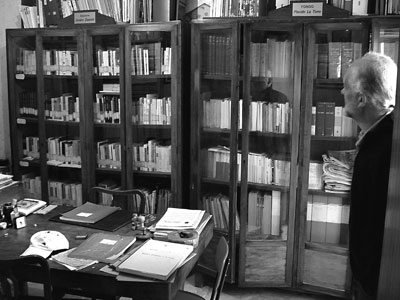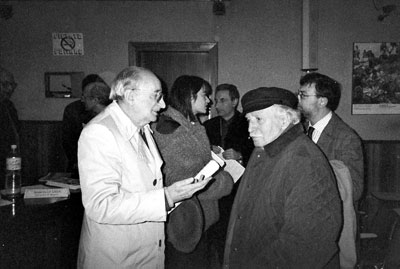 |
Messina, Biblioteca “Pietro Gori” – La sala principale |
The Library of Social Studies Pietro Gori was established in April 1989 on the initiative of Sandra Zappala (1), thanks to her happy meeting with a group of young Messina militants and historian Michele Strupia. Apply now to draft citizens anarchists and libertarians, including the lawyer Placido La Torre (2), which embody a group of enthusiastic researchers, characterized by inter-generational identity whose provenance extends from the Liberation Struggle in '68 and the '70s, to the movements of the first and the occupied social centers of the "Panther" at Genoa in 2001.
It is born at the same time that a library is the center of libertarian outreach activities: a cultural attempt to renew that common thread that brings to light the voices and the heat still coming from the button under a perpetually earthquake Messina.
The Library is located in the center of Gori, in Charles Citarella, and then moved to Viale Cadorna and then in the village of Tipoldo in 1995, where still lives and works in the collection of library material and documentary, based largely on donations and thanks to resources made available by its members, and specializes in historical and political context and anarchist. Oriented to action from below, the enhancement of individual resources and the freedom of expression, is characterized by increasingly precise and its methodology by comparison and collaboration with cultural and educational research centers, political organizations, unions and basic environmental, government and civic institutions.
 |
Messina, 12 Deicember 1998
Alessandro Zappalà and Placido La Torre |
Given the need for social identity, planning and resources, the group sets out, in dynamic relationship with the territory, a primary design drawings and specific practice guidelines.
Identifies three areas in which it operates and develops its own proposals:
• cultural and political space itself, where the initiatives, which range in various areas most (by education and active libertarian childbirth without violence, by thought and historical experience of anarchism analysis and proposals for social action, ecological and production), the league's active presence in the city, taking part in the emerging social demands and conflicts;
• a path of activity for social and environmental regeneration of the hill villages with an agricultural vocation (Tipoldo chosen as a prototype, where the Library has been active since 1992), in line with community residents and their adaptation to the age-old place of settlement, in prospect of overcoming the arkaic, unbalanced, conflictual separation between town and country;
• a scope of interventions aimed at exploiting the working class areas, marginal and "at risk", where the explosive potential for social transformation is implemented as equipment for buoyancy hierarchy of the city, a crucial and central in the area.
The long path, branching and intertwined several times over the years with local, regional and national, are developed in parallel with the size, organization and functionality of the Library: We have collected about 6,000 monographs, 400 periodicals and unique numbers (mainly in areas ranging historical, political and cultural), some archives, among which is of particular interest and considerable consistency in the one entitled Placido La Torre (consisting primarily of periodicals, documents, leaflets and publications, including, in addition anarchist collections almost complete, stand out periodic policy of Rome in 1944, cultural magazines such as The World and The Express in the early numbers, records of the 60s-70s), gray literature, other sound recordings and a collection of photographs , documents and relics of farmers Tipoldo.
Today the Library is going through a phase of adjustment through the systematic improvement of the library, the imminent implementation of a computerized catalog and stabilization of its path to a renewed network of relationships, new perspectives for research and action.
 Carmelo Ferrara Carmelo Ferrara
Translation by Enrico Massetti ("The other Fabrizio")
Note
- Alessandro Zappalà (1922-2000), a teacher from the libertarian methods of ITC Jaci Messina, active since 1948 in the FAI, free thinker eclectic culture and open social, European and international Esperanto reference.
- Placido La Torre (1920-2008), member of the FAI since 1946, propagandist and orator of national fame, a man passionate and consistent to his principles, tireless political defender (took part also in the Valpreda process), pro rated for the deep legal education.
|